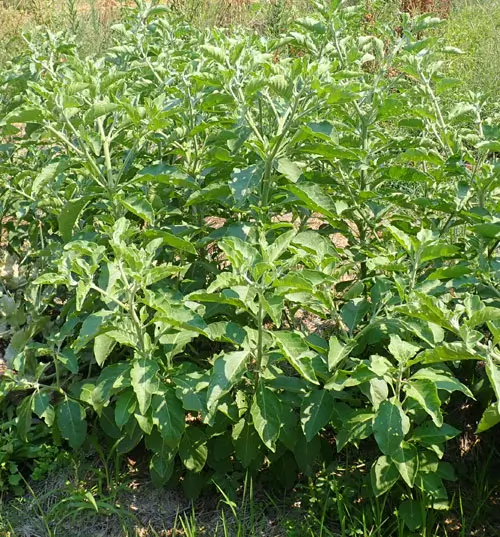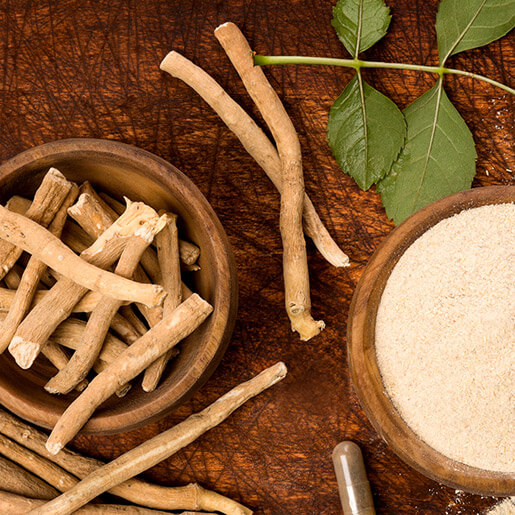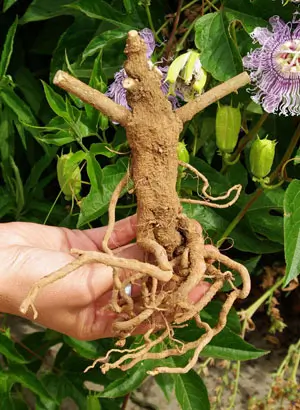Efficacy and Tolerance of Ashwagandha Root Extract in the Elderly
Improving General Well-Being and Sleep by Seniors?
Ashwagandha is a powerful adaptogen that has been utilized in Ayurvedic therapy for thousands of years. It has traditionally been used to treat a variety of diseases and overall well-being, including senior individuals.
Quality of life (QoL) management, particularly joint pain management, sleep, and overall well-being, remains a struggle for the aged. With the world’s older population growing, effective QoL control by medicine and nutrition is a crucial healthcare priority.
A scientific study was conducted to see how safe, effective, and tolerable Ashwagandha (Withania somnifera (L.) Dunal.) root extract was for improving overall health and sleep in the elderly.
Study Methods
Individuals aged 65 to 80 years old were enrolled in this 12-week prospective, randomized, double-blind, placebo-controlled trial. For 12 weeks, participants were given either Ashwagandha root extract at a dose of 600 mg/day or identical placebo capsules at the same dose.
Ashwagandha Scientific Study Results
In comparison to the placebo group, the Ashwagandha therapy group showed statistically significant improvement. Individual domain scores improved as well.
Both groups had low sleep quality and mental alertness when they awoke at the start of the study. However, when compared to the placebo group, the Ashwagandha treatment group had a substantial improvement in sleep quality and mental alertness.
In the study population, there was an overall improvement in general well-being, sleep quality, and mental alertness. The test product was tolerated well by the experimental group population, and the study participants rated it as safe and beneficial.
Ashwagandha Study Conclusion
According to the findings, Ashwagandha root extract was effective in increasing the older participants’ quality of life, sleep quality, and mental alertness. For the elderly, the recommended dose employed in this study could be helpful.

Ashwagandha – Should I get some?
For thousands of years, Ayurveda has provided greater health advantages for a variety of disorders as well as general well-being and rejuvenation. As a result, Ayurvedic therapy may be an essential alternative for the elderly.
Through adequate Ayurvedic ingredient dosage, you can combat health-related concerns and improve your quality of life (QoL), such as mobility impairment, weariness, and other conditions.
Ashwagandha, often known as Indian Ginseng or Winter Cherry, is one of Ayurveda’s most treasured medicines. Its scientific name is Withania somnifera (L.) Dunal. This plant has been used as a “Rasayana” or rejuvenator for ages, assisting in the promotion of health and longevity, as well as delaying the aging process and acting as a revitalizer.
Because of its powerful effects on growth, body weight, lubricating factor, and main tissue development activities, Ashwagandha is also known as “Sattvic Kapha Rasayana”. Many pharmacological investigations have been carried out to examine Ashwagandha’s numerous therapeutic qualities.
Both Ayurveda and Unani medicine use the roots of Ashwagandha for therapeutic purposes. Oral treatment of Ashwagandha root extract to rats has been shown to induce sleep. Scientific research has shown that Ashwagandha is well tolerated in people and can increase testosterone while lowering cortisol levels.
A recent study on C. elegans successfully proved that Ashwagandha root extract increased the worm’s longevity . Another study on HeLa cells found that Ashwagandha root extract boosted telomerase activity, indicating an anti-aging action.
Because to insomnia, improving quality of life (QoL) remains a key challenge for the elderly. Sleep quality has long been regarded as a reliable indicator of the physical and mental health of the elderly.
Obstructive sleep apnea and poor sleep quality might cause cognitive problems. Furthermore, poor sleep quality has been linked to a number of other physiological difficulties, including pain sensitivity, depression, kidney function, and other life-threatening health problems.

The relationship between insomnia and mortality in senior populations has been studied in a large cohort.
Aging is a natural occurrence as well as a physiological, psychological, and biological condition that all individuals must face. The human being is looking for a fountain of youth that will either stop or slow down the aging process.
The scientific study of the aging process has recently been given substantial consideration. In all model species, primates, and humans, apoptosis and senescence have been thoroughly investigated.
In comparison to the previous century, improvements in healthcare services contributed to an increase in the elderly population and a lower mortality rate. According to the World Population Prospects 2019 data, the current aging population is 9% in 2019 and is expected to rise to 16% by 2050.
In comparison to today’s population, the number of people over the age of 80 would treble. In 2018, for the first time in the history of the human census, the world’s elderly population (65 years) outnumbered youngsters (5 years).
As a result, the healthcare industry faces a problem in managing the elderly population.
For the current elderly population, proper health maintenance has remained an unfulfilled ambition. Lack of vitality, muscle weakness, osteoporosis, joint pains, cardiovascular troubles, urological problems, and malignancies are all ravaging this rising demographic around the world. Regrettably, the available options are restricted.
Furthermore, side effects and reliance on specific medications are also a worry. A remedy must be found quickly, and correct supplementation of critical vitamins, minerals, and other vitalizing components could be provided to keep the elderly population healthy.
Yoga, herbal medication, and workouts have all been shown to be useful in controlling age-related illnesses.
The purpose of this 12-week trial was to see if supplementing with Ashwagandha root extract may improve various aspects of QoL and sleep metrics in the senior population.
Aging is a natural, ongoing biological process that is influenced by a variety of physiological, social, psychological, and environmental factors. Aging is linked to a variety of diseases and is defined by a gradual loss of function, making it a substantial risk factor for neurodegenerative diseases, malignancies, cardiovascular disease, and diabetes.

Since ancient times, Ayurveda has recognized aging to be a major health context. In classical Ayurveda, this is referred to as “Jara” (aging or decreasing phase).
Supplementing with ashwagandha could be a viable option for addressing aging issues such as sleep quality and mental attentiveness. According to previous research, Ashwagandha has a good effect on overall well-being, including an antioxidant effect that is important in age-related disorders.
Efficacy, tolerability, and safety of Ashwagandha use in various situations have been shown in several clinical investigations. When compared to the respective placebo, the root extract of Ashwagandha was demonstrated to improve cardiorespiratory endurance, muscle strength and recovery, and general bodyweight control.
W. somnifera root extract improves sexual function in both men and women [6,27], in addition to contributing to general well-being.
The Ayurvedic health system recognizes Ashwagandha’s importance in promoting lifespan, however evidence based on current studies is sparse. Kumar et al. found that a pure root extract of Ashwagandha can extend the lifetime of C.elegans by about 20% compared to their usual lifespan.
Despite the fact that no human studies have been conducted to now, the findings of the study may reveal a significant future possibility. All of these pieces of research provide valuable insight into Ashwagandha’s role in overall health and well-being.
It was an obvious decision to investigate the benefits of Ashwagandha in the aging population because it is an outstanding multipurpose natural supplement. The goal of this study was to see how Ashwagandha supplementation affected the older population in terms of safety, efficacy, tolerance, improving sleep, and rejuvenation.
Conclusion: Ashwagandha, Good for Seniors?
The benefits of Ashwagandha have been proved in ancient literature and Ayurvedic treatment regimens in a variety of illness situations, as well as in enhancing vigor and rejuvenation. According to scientific sources, Ashwagandha includes sleep-inducing chemicals that help people of all ages sleep better.
Recently, we reported on the effects of Ashwagandha root extract on sleeplessness and anxiety. “Jara Chikitsa” (Aging treatment) and “Jara Vyadhi” (Aging-associated disorders) have remained a significant element of the conventional Ayurvedic treatment process, with Ashwagandha being indicated as one of the most effective remedies.
Ashwagandha has been shown to improve memory and cognition in healthy people as well as people with moderate cognitive impairment (MCI). As a result, Ashwagandha extract has the ability to combat many of the most common aging-related diseases.
The current study’s findings reveal that senior participants who took Ashwagandha root extract had much better sleep, mental alertness, and quality of life (QoL) than those who took a placebo.
As a result, Ashwagandha root extract may be an acceptable and admirable alternative supplement for alleviating a variety of age-related health conditions, as well as enhancing overall general wellbeing in the elderly.
Read More About Anxiety And Treatment Tips For Panic Attacks.
Read More About: Is Medical Marijuana and Nectar Collectors Beneficial to Seniors?
This Article was inspired National Library of Medicine


